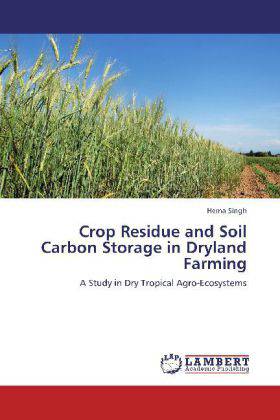
- Afhalen na 1 uur in een winkel met voorraad
- Gratis thuislevering in België vanaf € 30
- Ruim aanbod met 7 miljoen producten
- Afhalen na 1 uur in een winkel met voorraad
- Gratis thuislevering in België vanaf € 30
- Ruim aanbod met 7 miljoen producten
Zoeken
Crop Residue and Soil Carbon Storage in Dryland Farming
A Study in Dry Tropical Agro-Ecosystems
Hema Singh
Paperback | Engels
€ 58,45
+ 116 punten
Omschrijving
Decreasing trends of organic matter and plant-available nutrients in arable soils, other negative consequences of fertilizer inputs and frequent tillage call for newer techniques in agriculture, one such technique which has attracted considerable interest is microbial management. Microbial biomass is a small active fraction of the soil organic matter which turns over very rapidly, and holds a large pool of plant-available nutrients. It acts as a source and a sink of nutrients and is responsive to several agricultural practices. Soil organic carbon (SOC) has also been identified as a factor that is important to soil fertility as well as for the environment because of huge carbon sequestration potential of the soils. Present study was undertaken to evaluate the influence of applications of straw and chemical fertilizer on the soil microbial biomass, available nutrient pools and crop growth under reduced tillage, dryland conditions. The major hypothesis tested in this study was that the management practices which can increase the size of active soil organic pool can enhance the nutrient supply rate and hence crop growth in drylands under reduced tillage cultivation
Specificaties
Betrokkenen
- Auteur(s):
- Uitgeverij:
Inhoud
- Aantal bladzijden:
- 156
- Taal:
- Engels
Eigenschappen
- Productcode (EAN):
- 9783848421442
- Verschijningsdatum:
- 22/03/2012
- Uitvoering:
- Paperback
- Formaat:
- Trade paperback (VS)
- Afmetingen:
- 152 mm x 229 mm
- Gewicht:
- 235 g

Alleen bij Standaard Boekhandel
+ 116 punten op je klantenkaart van Standaard Boekhandel
Beoordelingen
We publiceren alleen reviews die voldoen aan de voorwaarden voor reviews. Bekijk onze voorwaarden voor reviews.











